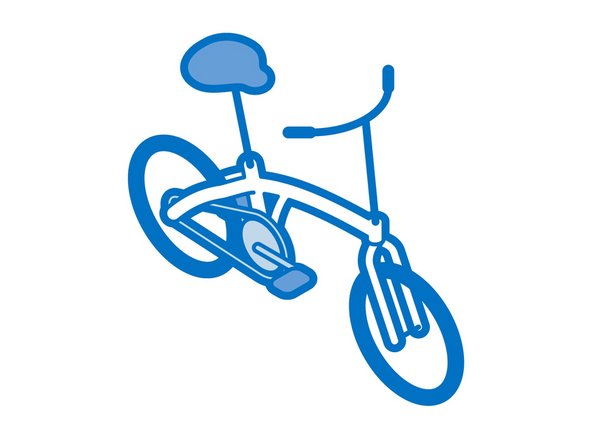Every week there are too many developments in the world of repair for any mere mortal to keep track of. Fortunately, the folks over at the Fight to Repair newsletter are here to help: recapping the most important repair news for iFixit readers. As a special offer, iFixit.com readers can claim a free, 60-day premium membership to the Fight to Repair newsletter. Visit fighttorepair.substack.com/ifixit.
Bicycles have long been associated with sustainability, but some critics argue that the introduction of e-bikes and resource-intensive materials is changing that narrative.
While it’s natural for us to categorize bicycles as inherently friendly to our environment, Low-Tech Magazine’s Kris De Decker reminds us that even something as seemingly simple as a bicycle has become more resource-intensive over time, prompting the need for a return to a more basic design.
We often associate bicycles with a more sustainable future, especially when imagining happy Danish people riding to farmers markets and coffee shops. E-bikes are often presented as an alternative to cars—and the per-trip energy use savings of taking an e-bike instead of a car are significant. Yet the reality is that achieving a bike-focused future is challenging in places like the US where cars and convenience reigns supreme and bike infrastructure is minimal. To reach this imagined utopia, De Decker suggests we consider the materials bikes are made of, their lifecycle, repairability, and breakdown properties.
For example, while we assume that bike-sharing means less production, and therefore less energy and carbon emissions, dockless bicycle systems actually require van drivers (gig workers) to patrol urban areas and pick up, charge, and redistribute the bikes, contributing to 118g of carbon emissions per kilometer when riding a shared aluminum bike. The energy savings figure for e-bikes also does not consider the energy cost of their production.

It’s important to note that not all bicycles are created equal, and their environmental impacts vary, particularly when we consider lifecycle. E-bikes, for instance, have more parts that could require replacement and owners may struggle to find parts in the long term due to the reliance on more complex components.
In 2022, for example, bike mechanics circulated a petition to e-bike manufacturers to stop producing “built to fail” budget bicycles, as Right to Repair Europe noted.
Extending Bicycle Lifespans with Repair
Despite the abundance of brick-and-mortar stores and online communities dedicated to bicycle repair, 95% of bikes in the US were imported from China in 2018, shipping thousands of miles to reach us. With over a billion bicycles in the world, it makes more sense to hold onto our bikes for longer and extend their lifespans through repair.
Repair has always been synonymous with the cycling community, but the trend towards prioritizing “innovation” has resulted in a culture of disposability and neglectful usage of bicycles at scale, potentially turning a low-impact technology into just another consumer trend. It’s not that e-bikes and bike-sharing are inherently bad, but they need to be evaluated for their efficacy before we label them as environmentally friendly.
Simpler solutions are often better, and we already know that repairing a bicycle is one of the easiest and most effective ways to extend its lifespan.
Bicycle
Two-wheeled, human-powered transportation. Decide if you want to search for your bike, the specific component or browse the troubleshooting wiki in the related pages section.
View DeviceOther News
- Fairphone launches on over-the-ear headphones: Dutch manufacturer Fairphone has released the Fairbuds XL, a pair of high-end over-ear headphones with a modular design that allows for self-repairs. The headphones are made from recycled and fair-trade materials and come with replacement parts, an easily replaceable battery, as well as a proprietary app with repair tutorials, and a storefront for ordering replacement parts. They are also weather-resistant and available for order in Europe for around $270.
- iPhone users are keeping their phones longer: Tom’s guide notes that an analysis from CIRP reveals that iPhone users are keeping their handsets for longer. In March 2022, 34% of users surveyed had a three-year-old iPhone or older, up from 26% in 2019. Although users had a sudden urge to upgrade in 2022, many are keeping their iPhones for longer due to the increasingly high cost of new smartphones, the retained value of iPhones, Apple’s long update schedule, the smaller upgrades between generations, and Apple’s modest improvements in repair and fixes.
- Microsoft says Windows 10 support will end in 2025: As Microsoft moves to Windows 11, raising concerns among users due to potential compatibility issues and increased electronic waste, as older computers may not meet the necessary requirements for the update. Critics also argue that Microsoft’s requirements for the new software seem arbitrary and unnecessary, as the computing power, RAM, and storage requirements for both Windows 10 and 11 are relatively low.
- John Deere’s transition to AI and autonomous tractors: The 21st century’s trend of capturing more power over products through digitization is nothing new. Through the integration of artificial intelligence, electrification, and autonomy, the John Deere is positioning itself as a leading player in green technology. However, these advancements also enable Deere to exercise a higher degree of oversight and control over their products.
- Californians deserve a right to repair their electronics even if Big Tech hates it: California lawmakers have an opportunity to enact a right to repair bill, which would require device manufacturers to give consumers access to repair manuals, allow them to open digital locks that might prevent them from repairing their own devices, and sell parts directly to consumers.






0 Comments